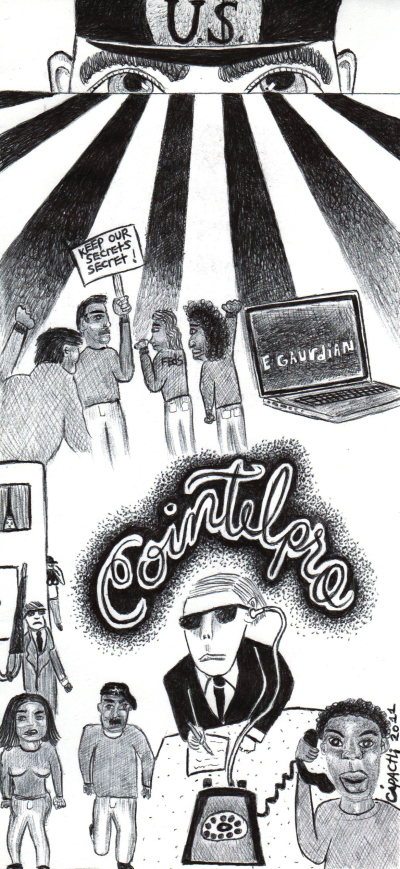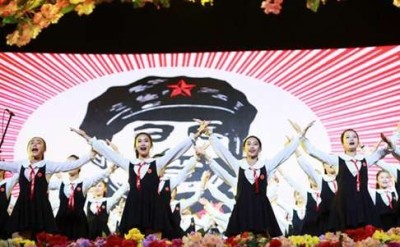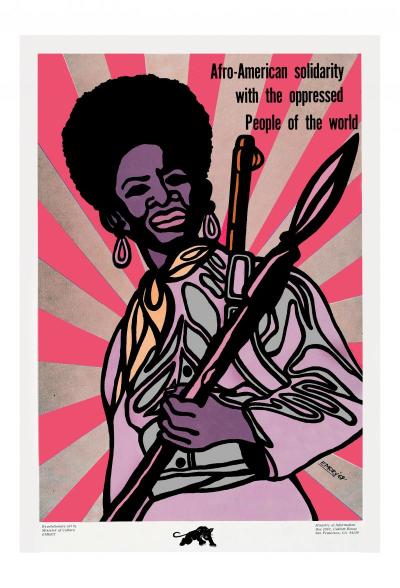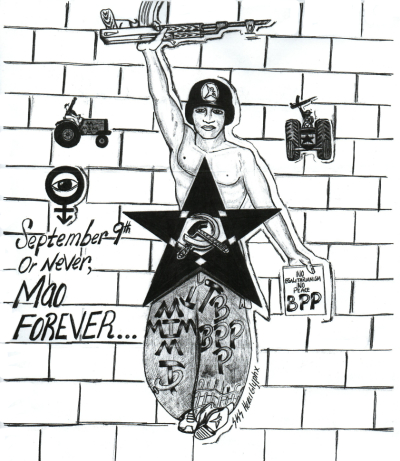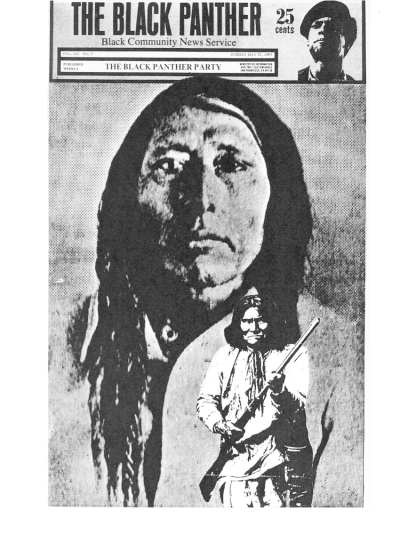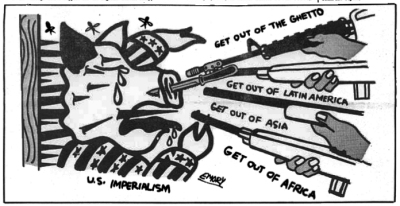
The Panther Legacy, Black Riders and Intercommunalism
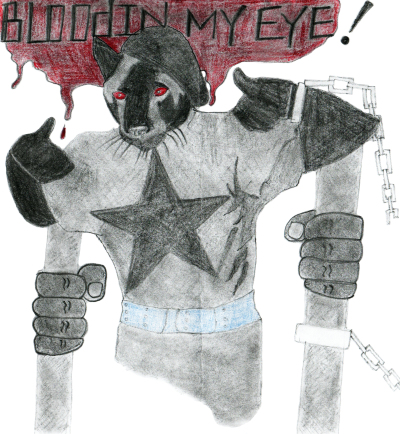
Uhuru of the Black Riders Liberation Party - Prison Chapter: 2016 marks the 50th anniversary of the founding of the original Black Panther Party for Self-Defense (BPP) by Dr. Huey P. Newton and Bobby Seale. This year also marks the 20th anniversary of the founding of the Black Riders Liberation Party, the New Generation Black Panther Party for Self-Defense, under the leadership of General T.A.C.O. (Taking All Capitalists Out).
The original BPP arose out of an immediate need to organize and defend the New Afrikan (Black) nation against vicious pig brutality that was taking place during the 1960s and 70s; while at the same time teaching and showing us through practice how to liberate ourselves from the death grip of Amerikkkan-style oppression, colonialism and genocide through its various Serve the People programs.
The Black Riders Liberation Party (BRLP) came about in 1996 when former Bloods and Crips came together in peace and unity while at the Youth Training School (a youth gang prison) in Los Angeles. The BRLP, which follows the historic example set by the original BPP, is a true United Lumpen Front against pig brutality, capitalism, and all its systems of oppression.
The political line of the BRLP, as taught by our General, is Revolutionary Afrikan Inter-communalism, which is an upgraded version of Huey’s Revolutionary Intercommunalism developed later in the party. Revolutionary Afrikan Intercommunalism is a form of Pan-Afrikanism and socialism. This line allows us to link the struggles of New Afrikans here in the Empire with Afrikans on the continent and in the diaspora. Thus Revolutionary Afrikan Intercommunalism is, in essence, revolutionary internationalism as it guides us towards building a United Front with Afrikan people abroad to overthrow capitalist oppression here in the United $tates and imperialism around the globe.
Our Black Commune Program is an upgraded version of the original BPP’s Ten-Point Platform and Program, which includes the demand for treatment for AIDS victims and an end to white capitalists smuggling drugs into our communities. [The Black Commune Program also adds a point on ecological destruction as it relates to the oppressed. -MIM(Prisons)]
Mao recognized, as did Che, that every revolutionary organization should have its own political organ – a newspaper – to counter the psychological warfare campaign waged by the enemy through corporate media, and to inform, educate and organize the people. Like the original BPP newspaper, The Black Panther, the BRLP established its own political organ, The Afrikan Intercommunal News Service, and took it a step further by creating the “Panther Power Radio” station to “discuss topics relative to armed self-defense against pig police terrorism and the corrupt prison-industrial complex,” among other topics.
Like the original BPP, the BRLP have actual Serve the People programs. When Huey would come across other Black radical (mostly cultural nationalist) organizations, he would often ask them what kind of programs they had to serve the needs of the people because he understood that revolution is not an act, but a process, and that most oppressed people learn from seeing and doing (actual experience). The BRLP’s programs consist of our Watch-A-Pig Program, Kourt Watch Program, George Jackson Freedom After-school Program, Squeeze the Slumlord project, BOSS Black-on-Black violence prevention and intervention program, gang truce football games, and Health Organizing Project, to name just a few. These lumpen tribal elements consciously eschew lumpen-on-lumpen reactionary violence and become revolutionaries and true servants of the people!
Finally, the BRLP continues the example set by the original BPP by actively building alliances and coalitions with other radical/revolutionary organizations. George Jackson stated that “unitary conduct implies a ‘search’ for those elements in our present situation which can become the basis for joint action.” (1) In keeping with this view and the BPP vision of a United Front Against Fascism, in 2012 the BRLP launched the Intercommunal Solidarity Committee as a mechanism for building a United Front across ideological, religious, national and ethnic/racial lines.
While I recognize that the white/euro-Amerikkkan nation in the United $tates is not an oppressed nation, but in fact represents a “privileged” class that benefits from the oppression and exploitation of the urban lumpen class here in the United $tates and Third World people, there exist a “dynamic sector” of radical, anti-racist, anti-imperialist white allies willing to commit “class suicide” and aid oppressed and exploited people in our national liberation struggles. And on that note I say “Black Power” and “All Power to the People.”
Wiawimawo of MIM(Prisons) responds: For this issue of Under Lock & Key we received letters attempting to feature the BRLP (like this one) as well as to critique them. For years, MIM(Prisons) and the readers of ULK have been watching this group with interest. We made a few attempts to dialogue directly with them, but the most concerted effort happened to coincide with the release of an attack on us by Turning the Tide, a newsletter that has done a lot to popularize the work of the BRLP. No direct dialogue occurred. We thank this BRLP comrade for the article above. The following is a response not directly to the above, but to the many statements that we have come across by the BRLP and what we’ve seen of their work on the streets.
On the surface the BRLP does have a lot similarities to the original BPP. It models its platform after the BPPs 10 point platform, which was modeled after Malcolm X’s. The BRLP members don all black as they confront the police and other state actors and racist forces. They speak to the poor inner-city youth and came out of lumpen street organizations. They have worked to build a number of Serve the People programs. And they have inspired a cadre of young New Afrikans across the gender line. In order to see the differences between MIM, the BRLP, and other organizations claiming the Panther legacy today, we need to look more deeply at the different phases of the Black Panther Party and how their political line changed.
APSP, AAPRP, NBPP
The BRLP regularly presents itself with the tagline, “the New Generation Black Panther Party for Self-Defense.” And it is not the first, or the only organization, to claim this mantel. The African Peoples’ Socialist Party (APSP) was perhaps the first, having worked with Huey P. Newton himself at the end of his life. That is why in discussing the Panther legacy, we need to specify exactly what legacy that is. For MIM, the period of 1966 to 1969 represented the Maoist phase of the BPP, and therefore the period we hold up as an example to follow and build on. Since the time that Huey was alive, the APSP has shifted focus into building an African Socialist International in the Third World. We see this as paralleling some of the incipient errors in the BRLP and the NABPP that we discuss below.
While the APSP goes back to the 1980s, we can trace another contemporary organization, the All-African People’s Revolutionary Party, to the 1960s.(1) The brain-child of Ghanan President Kwame Nkrumah, the AAPRP in the United $tates was led by Kwame Toure, formerly Stokely Carmichael. The AAPRP came to embody much of the cultural and spiritual tendencies that the Panthers rejected. The BPP built on the Black Power and draft resistance movements that Carmichael was key in developing while leading the Student Non-violent Coordinating Committee (SNCC).(2) Carmichael left SNCC, joining the BPP for a time, and tried to unite the two groups. But the Panthers later split with SNCC because of SNCC’s rejection of alliances with white revolutionaries, their promotion of pan-Afrikanism and Black capitalism. Carmichael’s allies were purged from the BPP for being a “bunch of cultural nationalist fools” trying “to undermine the people’s revolution…” “talking about some madness he called Pan-Africanism.”(3)
In the 1990s, we saw a surge in Black Panther revivalism. MIM played a role in this, being the first to digitize many articles from The Black Panther newspaper for the internet and promoting their legacy in fliers and public events. MIM did not seem to have any awareness of the Black Riders Liberation Party at this time. There was a short-lived Ghetto Liberation Party within MIM that attempted to follow in Panther footsteps. Then the New Black Panther Party began to display Panther regalia at public rallies in different cities. While initially optimistic, MIM later printed a critique of the NBPP for its promotion of Black capitalism and mysticism, via its close connection to the Nation of Islam.(4) Later the NBPP became a darling of Fox News, helping them to distort the true legacy of the BPP. Last year the NBPP further alienated themselves by brutalizing former Black Panther Dhoruba bin Wahad and others from the Nation of Gods and Earths and the Free the People Movement. While there is little doubt that the NBPP continues to recruit well-intentioned New Afrikans who want to build a vanguard for the nation, it is evident that the leadership was encapsulated by the state long ago.
Huey’s Intercommunalism
Readers of Under Lock & Key will certainly be familiar with the New Afrikan Black Panther Party, which was originally an independent prison chapter of the NBPP. Their promotion of Maoism and New Afrikan nationalism was refreshing, but they quickly sided with Mao and the Progressive Labor Party against the BPP and more extreme SNCC lines on the white oppressor nation of Amerikkka. They went on to reject the nationalist goals of the BPP, embracing Huey’s theory of intercommunalism. The NABPP and the BRLP both embrace forms of “intercommunalism” as leading concepts in their ideological foundations. And while we disagree with both of them, there are many differences between them as well. This is not too surprising as the theory was never very coherent and really marked Newton’s departure from the original Maoist line of the Party. As a student of David Hilliard, former BPP Chief of Staff, pointed out around 2005, Hilliard used intercommunalism as a way to avoid ever mentioning communism in a semester-long class on the BPP.(5) In the early 1970s, Huey seemed to be using “intercommunalism” in an attempt to address changing conditions in the United $tates and confusion caused by the failure of international forces to combat revisionism in many cases.(6)
Probably the most important implication of Huey’s new line was that he rejected the idea that nations could liberate themselves under imperialism. In other words he said Stalin’s promotion of building socialism in one country was no longer valid, and Trotsky’s theory of permanent revolution was now true. This was in 1970, when China had just developed socialism to the highest form we’ve seen to date through the struggles of the Great Proletarian Cultural Revolution, which also began 50 years ago this year. Huey P. Newton’s visit to China in 1971 was sandwiched by visits from war criminal Henry Kissinger and U.$. President Richard Nixon. Chinese Premier Zhou Enlai, who would go on to foster normalized relations with the U.$. imperialists, stated that China was ready to negotiate or fight the United $tates in 1971.(7) The Panther visit was a signal of their development of the second option. But after 1971, Chinese support for the Panthers dissipated as negotiations with the imperialists developed.
A bigger problem with Huey’s intercommunalism was how do we address the Amerikkkan oppressor nation when ey claims there are no more states, there are no more nations? In eir “speech at Boston College” in 1970 ey specifically refers to Eldridge Cleaver’s “On the Ideology of the Black Panther Party” in order to depart from it. Newton rejects the analysis of the Black nation as a colony of Amerikkka that must be liberated. That Cleaver essay from 1969 has great unity with MIM line and is where we depart with the NABPP and BRLP who uphold the 1970-1 intercommunalism line of Huey’s.(8)
Black Riders and NABPP Interpret Intercommunalism
To take a closer look at the BRLP itself, let us start with General T.A.C.O.’s essay “African Intercommunalism I.” Tom Big Warrior of the NABPP camp has already written a review of it, which makes a number of critiques that we agree with. He calls out the BRLP for accepting “race” as a real framework to analyze society, yet the NABPP line also rejects nation based on Huey’s intercommunalism. At times, the NABPP and BRLP still use the term nation and colony to refer to New Afrika. This seems contradictory in both cases. Tom Big Warrior is also very critical of the BRLP’s claim to update Huey’s theory by adding African cultural and spiritual elements to it. This is something the Panthers very adamantly fought against, learning from Fanon who wrote in Wretched of the Earth, one of the Panthers’ favorite books: “The desire to attach oneself to tradition or bring abandoned traditions to life again does not only mean going against the current of history but also opposing one’s own people”.(9) This revision of intercommunalism is one sign of the BRLPs conservatism relative to the original BPP who worked to create the new man/womyn, new revolutionary culture and ultimately a new society in the spirit of Mao and Che.
The NABPP is really the more consistent proponent of “revolutionary intercommunalism.” In their analysis a worldwide revolution must occur to overthrow U.$. imperialism. This differs from the MIM view in that we see the periphery peeling off from imperialism little-by-little, weakening the imperialist countries, until the oppressed are strong enough to impose some kind of international dictatorship of the proletariat of the oppressed nations over the oppressor nations. The NABPP says we “must cast off nationalism and embrace a globalized revolutionary proletarian world view.”(10) They propose “building a global United Panther Movement.” These are not really new ideas, reflecting a new reality as they present it. These are the ideas of Trotsky, and at times of most of the Bolsheviks leading up to the Russian revolution.
Even stranger is the BRLP suggestion that, “once we overthrow the Amerikkkan ruling class, there will be a critical need to still liberate Africa.”(11) The idea that the imperialists would somehow be overthrown before the neo-colonial puppets of the Third World is completely backwards. Like the APSP, the NABPP and the BRLP seem to echo this idea of a New Afrikan vanguard of the African or World revolution. MIM(Prisons) disagrees with all these parties in that we see New Afrika as being closer to Amerika in its relation to the Third World, despite its position as a semi-colony within the United $tates.(12)
The NABPP claims that “Huey was right! Not a single national liberation struggle produced a free and independent state.”(13) And they use this “fact” to justify support for “Revolutionary Intercommunalism.” Yet this new theory has not proven effective in any real world revolutions, whereas the national liberation struggle in China succeeded in building the most advanced socialist system known to history. Even the Panthers saw steep declines in their own success after the shift towards intercommunalism. So where is the practice to back up this theory?
We also warn our readers that both the NABPP and BRLP make some outlandishly false statistical claims in order to back up their positions. For example, the NABPP tries to validate Huey’s predictions by stating, “rapid advances in technology and automation over the past several decades have caused the ranks of the unemployed to grow exponentially.”(13) It is not clear if they are speaking globally or within the United $tates. But neither have consistent upward trends in unemployment, and certainly not exponential trends! Meanwhile, in an essay on the crisis of generational divides and tribal warfare in New Afrika the BRLP claims that the latter “has caused more deaths in just Los Angeles than all the casualties in the Yankee imperialist Vietnam war combined!!!”(14) There were somewhere between 1 million and 3 million deaths in the U.$. war against Vietnamese self-determination. [EDIT: Nick Turse cites Vietnam official statistics closer to 4 million] Los Angeles sees hundreds of deaths from gang shootings in a year. We must see things as they are, and not distort facts to fit our propaganda purposes if we hope to be effective in changing the world.
Black Riders
We will conclude with our assessment of the BRLP based on what we have read and seen from them. While we dissect our disagreements with some of their higher level analysis above, many of their articles and statements are quite agreeable, echoing our own analysis. And we are inspired by their activity focusing on serving and organizing the New Afrikan lumpen on the streets. In a time when New Afrikan youth are mobilizing against police brutality in large numbers again, the BRLP is a more radical force at the forefront of that struggle. Again, much of this work echoes that of the original BPP, but some of the bigger picture analysis is missing.
In our interactions with BRLP members we’ve seen them promote anarchism and the 99% line, saying that most white Amerikkkans are exploited by capitalism. BRLP, in line with cultural nationalism, stresses the importance of “race,” disagreeing with Newton who, even in 1972, was correctly criticizing in the face of rampant neo-colonialism: “If we define the prime character of the oppression of blacks as racial, then the situation of economic exploitation of human beings by human being can be continued if performed by blacks against blacks or blacks against whites.”(15) Newton says we must unite the oppressed “in eliminating exploitation and oppression” not fight “racism” as the BRLP and their comrades in People Against Racist Terror focus on.
This leads us to a difference with the BRLP in the realm of strategy. It is true that the original BPP got into the limelight with armed confrontations with the pigs. More importantly, it was serving the people in doing so. So it is hard to say that the BPP was wrong to do this. While Huey concluded that it got ahead of the people and alienated itself from the people, the BRLP seems to disagree by taking on an even more aggressive front. This has seemingly succeeded in attracting the ultra-left, some of whom are dedicated warriors, but has already alienated potential allies. While BRLP’s analysis of the BPPs failure to separate the underground from the aboveground is valuable, it seems to imply a need for an underground insurgency at this time. In contrast, MIM line agrees with Mao that the stage of struggle in the imperialist countries is one of long legal battles until the imperialists become so overextended by armed struggles in the periphery that the state begins to weaken. It is harder to condemn Huey Newton for seeing that as the situation in the early years of the Panthers, but it is clearly not the situation today. In that context, engaging in street confrontations with racists seems to offer more risk than reward in terms of changing the system.
While the BRLP doesn’t really tackle how these strategic issues may have affected the success and/or demise of the BPP, it also does not make any case for how a lack of cultural and spiritual nationalism were a shortcoming that set back the Panthers. BRLP also spends an inordinate amount of their limited number of articles building a cult of persynality around General T.A.C.O. So despite its claims of learning from the past, we see its analysis of the BPP legacy lacking in both its critiques and emulations of BPP practices.
While physical training is good, and hand-to-hand combat is a potentially useful skill for anyone who might get in difficult situations, there should be no illusions about such things being strategic questions for the success of revolutionary organizations in the United $tates today. When your people can all clean their rifle blind-folded but they don’t even know how to encrypt their email, you’ve already lost the battle before it’s started.
Finally, the BRLP has tackled the youth vs. adult contradiction head on. Its analysis of how that plays out in oppressed nations today parallels our own. And among the O.G. Panthers themselves they have been very critical as well, and with good cause. It is clear that we will need a new generation Black Panthers that is formed of and led by the New Afrikan youth of today. But Huey was known to quote Mao that with the correct political line will come support and weapons, and as conditions remain much less revolutionary than the late 1960s, consolidation of cadre around correct and clear political lines is important preparatory work for building a new vanguard party in the future.




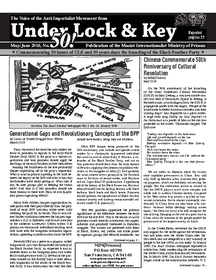
 Download printable PDF
Download printable PDF



